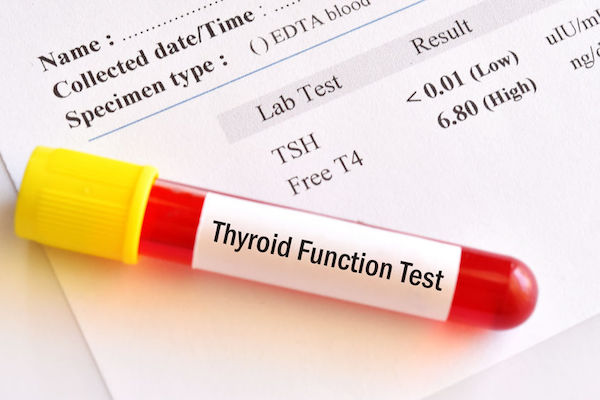Hyperthyroidism is a condition in which the thyroid gland is overactive and makes excessive amounts of thyroid hormone. This speeds up your body’s metabolism, leading to symptoms such as shaking, weight loss and anxiety.

Your thyroid gland is in your neck, in front of your windpipe. It releases two hormones to control how quickly your body uses its energy stores and how sensitive your body is to other hormones.
The most common causes of overactive thyroid are:
- Graves’ disease: This is an autoimmune disease. Your immune system produces antibodies that trigger your thyroid gland to produce more thyroid hormone than your body needs.
- Nodular thyroid disease: Lumps or nodules develop in your thyroid gland and produce thyroid hormones.
- Certain medicines (for example, amiodarone): Iodine in medicines can trigger your thyroid gland to produce thyroid hormones.
Overactive thyroid is more common in women. About 8 in 100 women and 1 in 100 men reportedly develop hyperthyroidism at some stage of their lives. It can occur at any age.
During pregnancy, if you have pre-existing hyperthyroidism or hypothyroidism (underactive thyroid), you may require more medical attention to control these conditions, especially in the first trimester.
What are its symptoms?
Hyperthyroidism can cause a wide variety of signs and symptoms, including:
- An enlarged thyroid gland (goitre), which may appear as a swelling at the base of your neck
- Extreme tiredness
- Insomnia
- Anxiety and irritability
- Night sweats
- Depression
- Weight gain
- Hair loss
- Unexplained weight loss
- Rapid heartbeat irregular heartbeat (arrhythmia) or pounding of your heart (palpitations)
- Appetite increase
- Sore joints
- Changes in menstrual patterns
- Increased sensitivity to heat
- Diarrhoea
- Nausea
These symptoms aren’t always caused by an overactive thyroid but if you have them it’s best to consult your doctor.
Some medications (beta blockers), which are used to treat high blood pressure and other conditions, can mask many of the signs of hyperthyroidism.
How is it diagnosed?
Your doctor will ask about your symptoms, examine you and ask you about your medical history. He/she may also ask if you have a family history of autoimmune disease or thyroid disease.
A blood sample may also be taken. This will measure your levels of thyroid stimulating hormone (TSH). It is made in the pituitary gland in your brain and controls the production of the thyroid hormones, thyroxine (T4) and triiodothyronine (T3).
If your thyroid gland is overactive, your level of TSH will be low. If this is shown in your blood test, your thyroid hormone levels will also be measured.
If blood tests show high levels of either T4 or T3 (or both) and a low level of TSH , this confirms an overactive thyroid.
What are your treatment options?
Your doctor will advise you about your treatment options or refer you to an endocrinologist (a specialist in identifying and treating thyroid conditions).
Several treatments for hyperthyroidism exist. The best approach for you depends on your age, physical condition, the underlying cause of the hyperthyroidism, personal preference and the severity of your disorder.
These include:
- Radioactive iodine treatment
- Anti-thyroid medication
- Beta blockers
- Surgery (thyroidectomy)
Surgery risks include damage to your vocal cords and parathyroid glands — four tiny glands situated on the back of your thyroid gland that help control the level of calcium in your blood.
Can it be prevented?
There is no known way to prevent hypothyroidism. With careful management, however, you should be able to lead a normal, healthy life. Take note of the prevalence of Graves’ disease in your family (it is genetic), and have regular physical examinations.
IMAGE CREDIT: 123rf.com
